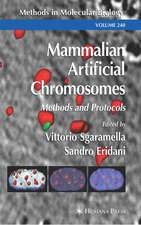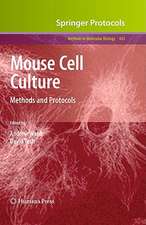Genomic Imprinting: Methods and Protocols: Methods in Molecular Biology, cartea 181
Editat de Andrew Warden Limba Engleză Paperback – 10 noi 2010
| Toate formatele și edițiile | Preț | Express |
|---|---|---|
| Paperback (1) | 719.95 lei 6-8 săpt. | |
| Humana Press Inc. – 10 noi 2010 | 719.95 lei 6-8 săpt. | |
| Hardback (1) | 726.68 lei 6-8 săpt. | |
| Humana Press Inc. – 10 oct 2001 | 726.68 lei 6-8 săpt. |
Din seria Methods in Molecular Biology
- 9%
 Preț: 791.63 lei
Preț: 791.63 lei - 23%
 Preț: 598.58 lei
Preț: 598.58 lei - 20%
 Preț: 882.98 lei
Preț: 882.98 lei -
 Preț: 252.05 lei
Preț: 252.05 lei - 5%
 Preț: 802.70 lei
Preț: 802.70 lei - 5%
 Preț: 729.61 lei
Preț: 729.61 lei - 5%
 Preț: 731.43 lei
Preț: 731.43 lei - 5%
 Preț: 741.30 lei
Preț: 741.30 lei - 5%
 Preț: 747.16 lei
Preț: 747.16 lei - 15%
 Preț: 663.45 lei
Preț: 663.45 lei - 18%
 Preț: 1025.34 lei
Preț: 1025.34 lei - 5%
 Preț: 734.57 lei
Preț: 734.57 lei - 18%
 Preț: 914.20 lei
Preț: 914.20 lei - 15%
 Preț: 664.61 lei
Preț: 664.61 lei - 15%
 Preț: 654.12 lei
Preț: 654.12 lei - 18%
 Preț: 1414.74 lei
Preț: 1414.74 lei - 5%
 Preț: 742.60 lei
Preț: 742.60 lei - 20%
 Preț: 821.65 lei
Preț: 821.65 lei - 18%
 Preț: 972.30 lei
Preț: 972.30 lei - 15%
 Preț: 660.49 lei
Preț: 660.49 lei - 5%
 Preț: 738.41 lei
Preț: 738.41 lei - 18%
 Preț: 984.92 lei
Preț: 984.92 lei - 5%
 Preț: 733.29 lei
Preț: 733.29 lei -
 Preț: 392.60 lei
Preț: 392.60 lei - 5%
 Preț: 746.26 lei
Preț: 746.26 lei - 18%
 Preț: 962.66 lei
Preț: 962.66 lei - 23%
 Preț: 860.22 lei
Preț: 860.22 lei - 15%
 Preț: 652.64 lei
Preț: 652.64 lei - 5%
 Preț: 1055.50 lei
Preț: 1055.50 lei - 23%
 Preț: 883.87 lei
Preț: 883.87 lei - 19%
 Preț: 491.89 lei
Preț: 491.89 lei - 5%
 Preț: 1038.86 lei
Preț: 1038.86 lei - 5%
 Preț: 524.16 lei
Preț: 524.16 lei - 18%
 Preț: 2122.34 lei
Preț: 2122.34 lei - 5%
 Preț: 1299.23 lei
Preț: 1299.23 lei - 5%
 Preț: 1339.12 lei
Preț: 1339.12 lei - 18%
 Preț: 1390.26 lei
Preț: 1390.26 lei - 18%
 Preț: 1395.63 lei
Preț: 1395.63 lei - 18%
 Preț: 1129.65 lei
Preț: 1129.65 lei - 18%
 Preț: 1408.26 lei
Preț: 1408.26 lei - 18%
 Preț: 1124.92 lei
Preț: 1124.92 lei - 18%
 Preț: 966.27 lei
Preț: 966.27 lei - 5%
 Preț: 1299.99 lei
Preț: 1299.99 lei - 5%
 Preț: 1108.51 lei
Preț: 1108.51 lei - 5%
 Preț: 983.76 lei
Preț: 983.76 lei - 5%
 Preț: 728.16 lei
Preț: 728.16 lei - 18%
 Preț: 1118.62 lei
Preț: 1118.62 lei - 18%
 Preț: 955.25 lei
Preț: 955.25 lei - 5%
 Preț: 1035.62 lei
Preț: 1035.62 lei - 18%
 Preț: 1400.35 lei
Preț: 1400.35 lei
Preț: 719.95 lei
Preț vechi: 757.85 lei
-5% Nou
Puncte Express: 1080
Preț estimativ în valută:
137.76€ • 143.85$ • 113.76£
137.76€ • 143.85$ • 113.76£
Carte tipărită la comandă
Livrare economică 15-29 aprilie
Preluare comenzi: 021 569.72.76
Specificații
ISBN-13: 9781617371646
ISBN-10: 1617371645
Pagini: 392
Ilustrații: XII, 377 p.
Dimensiuni: 152 x 229 x 24 mm
Greutate: 0.52 kg
Ediția:Softcover reprint of hardcover 1st ed. 2002
Editura: Humana Press Inc.
Colecția Humana
Seria Methods in Molecular Biology
Locul publicării:Totowa, NJ, United States
ISBN-10: 1617371645
Pagini: 392
Ilustrații: XII, 377 p.
Dimensiuni: 152 x 229 x 24 mm
Greutate: 0.52 kg
Ediția:Softcover reprint of hardcover 1st ed. 2002
Editura: Humana Press Inc.
Colecția Humana
Seria Methods in Molecular Biology
Locul publicării:Totowa, NJ, United States
Public țintă
ResearchCuprins
Generation of Monoparental Embryos for Investigation into Genomic Imprinting.- Deriving and Propagating Mouse Embryonic Stem Cell Lines for Studying Genomic Imprinting.- Balanced Translocations for the Analysis of Imprinted Regions of the Mouse Genome.- Production of YAC Transgenic Mice by Pronuclear Injection.- A Transgenic Approach to Studying Imprinted Genes.- Methylation-Sensitive Genome Scanning.- Subtraction-Hybridization Method for the Identification of Imprinted Genes.- Identification of Imprinted Loci by Methylation.- Ribonuclease Protection.- Quantitative RT-PCR-Based Analysis of Allele-Specific Gene Expression.- Allele-Specific In Situ Hybridization (ASISH).- RNA-FISH to Analyze Allele-Specific Expression.- Flow Cytometry and FISH to Investigate Allele-Specific Replication Timing and Homologous Association of Imprinted Chromosomes.- Southern Analysis Using Methyl-Sensitive Restriction Enzymes.- A PCR-Based Method for Studying DNA Methylation.- Bisulfite-Based Methylation Analysis of Imprinted Genes.- Direct Analysis of Chromosome Methylation.- In Vitro Methylation of Predetermined Regions in Recombinant DNA Constructs.- In Vitro Methylation of Specific Regions in Recombinant DNA Constructs by Excision and Religation.- Detection of Methyl?Sensitive DNA?Binding Proteins with Possible Involvement in the Imprinting Phenomenon.- Probing Chromatin Structure with Nuclease Sensitivity Assays.- Examining Histone Acetlylation at Specific Genomic Regions.- Purification of the MeCP2/Histone Deacetylase Complex from Xenopus laevis.- Reconstitution of Chromatin In Vitro.- Genomic Imprinting in Plants.
Recenzii
"...a multi-authored volume in which the methods of gene imprinting are discussed in detail in 25 chapters. The protocols are very detailed with multiple schemes and figures." - Journal of Pediatric Endocrinology and Metabolism
Textul de pe ultima copertă
Imprinted genes, many of which generally control growth and development, frequently lose their imprints during cancer progression, a loss that then plays a substantial role in uncontrolled tumor growth. Imprint instability also appears to be a major limitation to the success of mammalian cloning experiments. In Genomic Imprinting: Methods and Protocols, Andrew Ward and a team of experienced researchers have brought together a collection of optimized classic and vanguard techniques for the identification and analysis of imprinted genes. The majority of protocols describe molecular techniques that allow examination of gene structure or expression in an allele-specific manner. Protocols are included for identifying and cloning imprinted genes, for analyzing imprinted gene expression, for the study of DNA methylation and methylation-sensitive DNA-binding proteins, and for examining chromatin structure. There are also methods for the manipulation of mouse embryos to produce monoparental embryos and embryonic stem cells, and for the generation of transgenic mice with BAC, PAC, and YAC constructs. Each technique is described in step-by-step detail to ensure successful results.
Incorporating a wealth of knowledge from leading exponents in the field, Genomic Imprinting: Methods and Protocols brings together all the essential molecular, genetic, and embryological methods commonly used in today's laboratories for the identification and analysis of imprinted genes.
Incorporating a wealth of knowledge from leading exponents in the field, Genomic Imprinting: Methods and Protocols brings together all the essential molecular, genetic, and embryological methods commonly used in today's laboratories for the identification and analysis of imprinted genes.
Caracteristici
Includes supplementary material: sn.pub/extras



















